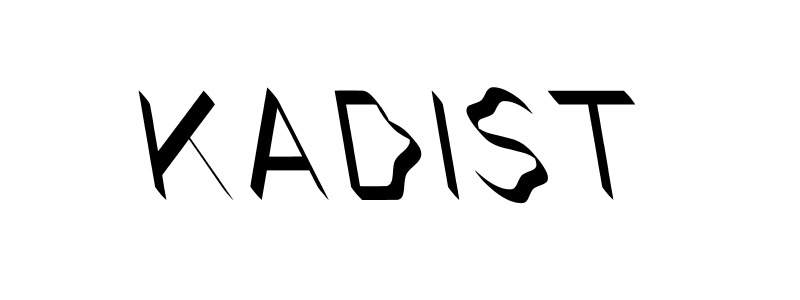
© » KADIST
Calderón & Piñeros (La Decanatura)
In Centro Espacial Satelital de Colombia (Colombian Satellite Space Center) , Calderón & Piñeros (La Decanatura) play tribute to two “stunning” satellite antennas installed in the small municipality of Chocontá where, in 1970, the Space Communications Center of Colombia was inaugurated. That same year, the first antenna, responsible for the transmission (via microwave) of radio and telephone signals was put in place and eleven years later, the second antenna or Ground Station for International Communications would complete the complex known as Space Communications Center. Excursions to visit what became known as the “Satellite City of Colombia” were common for decades.

© » KADIST
Julius Koller
Wordplay was a central focus of Koller’s work, in particular the acronym U. F. O, which he adapted in his diagrammatic drawings to stand variously for Univerzálna Futurologická Organizácia (Universal Futurological Organization, 1972–3), Univerzálny Filozoficky Ornament (Universal Philosophical Ornament, 1978) or Underground Fantastic Organization (1975), and which also appeared in a series of slapsticky self-portraits titled ‘U. F. O.–naut’ (1970–2007). These infinite variations on a common cipher constituted an insistent incantation of the Utopian principle.

© » KADIST
Arseny Zhilyaev
His large installation entitled The Museum of Proletarian Culture (2012) looked at the changes in artistic practice that have occurred in Russia throughout the last thirty years – from the amateur art of the late Soviet era to the commercialized post-Soviet cultural practices and the more recent self-expression via contemporary social networks. Thus, the exhibition becomes a whole installation where it is impossible to distinguish architecture from assemblage, facts from fantasy, document from fiction. It is a museum of museums where viewers find themselves in the era of didactic exhibitions; whereby the main protagonists are workers, engineers, and amateur artists, and finally replaced by the creative class of 1990s and 2000s.

© » KADIST
Arseny Zhilyaev
His large installation entitled The Museum of Proletarian Culture (2012) looked at the changes in artistic practice that have occurred in Russia throughout the last thirty years – from the amateur art of the late Soviet era to the commercialized post-Soviet cultural practices and the more recent self-expression via contemporary social networks. Thus, the exhibition becomes a whole installation where it is impossible to distinguish architecture from assemblage, facts from fantasy, document from fiction. It is a museum of museums where viewers find themselves in the era of didactic exhibitions; whereby the main protagonists are workers, engineers, and amateur artists, and finally replaced by the creative class of 1990s and 2000s.

© » KADIST
Brian Tripp
For many years Tripp has been involved in reviving Karuk ceremonies that had been discontinued for decades, he developed his signature abstract style, based in Karuk design, ceremonial regalia forms, and related cultural and political iconography. The two works in the KADIST collection are a continuation of these forms with in the medium of sculpture.

© » KADIST
Julius Koller
This work is one of Koller’s many variations which he began to use from 1970 to describe the ‘cultural situations’ he created. His “Anti-Happenings” turned mundane events into ‘cultural’ and ‘subjective’ situations. He sought to create new cultural situations that weren’t new art, but rather new ways of living: a new creativity for a new humanistic culture.

© » KADIST
Lam Tung Pang
Drawing & Print (Drawing & Print)
Lam Tung Pang created Sketches from train ride Chicago to San Francisco during his travels through the United States researching American curatorial strategies for representing traditional Chinese painting in museums and cultural institutions. The drawings incorporate both traditional and contemporary Chinese landscape techniques to reflect on the memory, history, and aesthetic practices of the Chinese laborers who played a prominent role in the American westward expansion. By representing the Western landscape according to Chinese aesthetics, Lam calls attention to the distortions and cultural specificity of American representations of the Western landscape and non-Western cultures.

© » KADIST
Brian Tripp
For many years Tripp has been involved in reviving Karuk ceremonies that had been discontinued for decades, he developed his signature abstract style, based in Karuk design, ceremonial regalia forms, and related cultural and political iconography. The two works in the KADIST collection are a continuation of these forms with in the medium of sculpture.

© » KADIST
Arseny Zhilyaev
His large installation entitled The Museum of Proletarian Culture (2012) looked at the changes in artistic practice that have occurred in Russia throughout the last thirty years – from the amateur art of the late Soviet era to the commercialized post-Soviet cultural practices and the more recent self-expression via contemporary social networks. Thus, the exhibition becomes a whole installation where it is impossible to distinguish architecture from assemblage, facts from fantasy, document from fiction. It is a museum of museums where viewers find themselves in the era of didactic exhibitions; whereby the main protagonists are workers, engineers, and amateur artists, and finally replaced by the creative class of 1990s and 2000s.

© » KADIST
Yan Xing
Sexy shows Yan Xing unsuccessfully trying to reach orgasm in freezing temperatures among the falling rocks and howling winds of a precarious canyon. His erotic failure leaves the voyeur-viewer unfulfilled and disappointed. The work explores notions of identity, masculinity, sexuality, voyeurism, and cultural taboos.

© » KADIST
José Leonilson
O Africano (1984) is a large acrylic painting on canvas, made early in the artist’s career, and directly references both Leonilson’s artistic precursors and his desire to imagine and capture what it means to be Brazilian. It is about the importance for many Brazilians of their African ethnic and cultural heritage.

© » KADIST
Wimo Ambala Bayang
Composed of four images, the series Sleeping Elephant in the Axis of Yogyakarta (2011) explores the artist’s observation of how Javanese mythology and cosmology have marked the geography of Yogyakarta, the cultural centre of Indonesia. Through photomontage digital operation, an identical elephant is superimposed in front of iconic landmark of the city: Parangtritis Beach, Sultan Square, the City Monument and Mount Merapi. These four locations are spiritual symbols and the subject of cosmological beliefs in Indonesia and the imagery of elephant has long been considered as a cultural and religious icon.

© » KADIST
Arseny Zhilyaev
His large installation entitled The Museum of Proletarian Culture (2012) looked at the changes in artistic practice that have occurred in Russia throughout the last thirty years – from the amateur art of the late Soviet era to the commercialized post-Soviet cultural practices and the more recent self-expression via contemporary social networks. Thus, the exhibition becomes a whole installation where it is impossible to distinguish architecture from assemblage, facts from fantasy, document from fiction. It is a museum of museums where viewers find themselves in the era of didactic exhibitions; whereby the main protagonists are workers, engineers, and amateur artists, and finally replaced by the creative class of 1990s and 2000s.

© » KADIST
Juan Araujo
Drawing & Print (Drawing & Print)
Many of Araujo’s works depict reproductions and Libro Ponti II is a recreation of a book on Italian architect Gio Ponti. Ponti designed the Villa Planchart a private, modernist house in Caracas, Venezuela, which at the time it was built in 1956, reflected the emergence of a class increasingly globalized, both culturally and economically. Araujo’s replica of the book thus refers to the role and visibility of Venezuela in circuits of global cultural production.

© » KADIST
Fehras Publishing Practices
Borrowed Faces is a photo novel published in 2019. These framed colour photographs are selected scenes from the novel. They mimic the aesthetic of a dated comic strip but instead contain vibrantly coloured, digital photos; here the ‘live’ element of the photographic medium meets the theatrics of the graphic novel.

© » KADIST
Aria Dean
Although typically sold today as a novelty item for flower arrangements and interior decorating flourishes, cotton can also be seen as a proxy, through synecdoche, for US slavery. Dead Zone (4) by Aria Dean presents a preserved blossom of that trade’s primary cash crop, cotton, crystalized in a state of non-decay whilst encased under protective glass. Hidden in the base of the work is a signal jammer which prevents mobile phones from broadcasting when nearby.

© » KADIST
Tarik Kiswanson
Drawing & Print (Drawing & Print)
The artist’s Passings series are hand-sewn works composed of radiological scans of items of clothing loaned by the Tiraz Foundation in Jordan. These articles – Palestinian, Jordanian and other Arab costumes from the 19th and 20th centuries from the Widad Kamel Kawar dress collection – are mixed in with contemporary clothing sometimes borrowed from participants in Kiswanson’s performances. In this particular piece, a tracksuit is overlaid with an 18th century Jordanian Robe.

© » KADIST
Cristóbal Lehyt
Drawing & Print (Drawing & Print)
Cristóbal Lehyt has conducted thorough research on the historical and cultural complexity of the northern region of Chile where the Atacama Desert is located. This area, rich both in terms of its cultural heritage and its natural resources (such as the copper mines), is at the origins of some of the most dramatic episodes in the country’s recent political history. With the series Untitled (Given a wall, what’s happening behind it?)

© » KADIST
Mazenett Quiroga
Gente Serpiente (Serpent People) is a piece made with the wheels of bikes, twisted, intertwined and painted like skins of tropical poisonous snakes. This sculpture, as well as other pieces by Mazenett and Quiroga, seeks to reveal and re-inscribe everyday and ordinary objects within a mythological tradition, to reconnect them with an origin in order to recognize their hidden life and meaning. These objects represent the life cycle and the animal, as well as cultural and geological time: long ago they were marine organisms and through the action of sand, sediment and mud, in oil, then in wheels they are transformed.

© » KADIST
Bayrol Jiménez
Sombras de los Valles (Shadows of the Valleys) is part of a series of works created by Bayrol Jiménez in which he is influenced by hand-painted signs and large billboards in Mexico. From small artisanal store-front insignia to widespread symbols and lettering, Jiménez looks at how this iconography shapes Mexican cultural identity. It is worth noting that the hand painted signs especially are highly unique, especially in an age of homogenised digital images and reproduced typefaces.

© » KADIST
Martine Syms
Her 2016 video installation quotes the sitcom-as-form and also draws from a 1907 comedic short, Laughing Gas. Syms’s 4-channel installation follows the central character (an aspiring artist also named Martine Syms) on a journey home from the dentist after receiving “laughing gas.” Mixing multiple points of view, clips borrowed from TV, as well as layers of comedy, fiction, reality, and critique, Syms’ work also delves into issues of race, culture, and representation. For Los Angeles-based Martine Syms, popular culture, television, and the cultural histories woven through both are starting points for her interdisciplinary art practice.

© » KADIST
Bani Abidi
The threshold in contemporary Pakistan between the security of private life and the increasingly violent and unpredictable public sphere is represented in Abidi’s 2009 series Karachi . These staged photographs were shot against the backdrop of the city’s empty streets at sundown during the holy month of Ramadan. During this time, Muslims fast and retreat indoors, leaving the city eerily empty.

© » KADIST
Enrique Ramirez
In Un Hombre que Camina (A Man Walking) (2011-2014), the sense of rhythm and timing is overpowered by the colossal sense of timelessness of this peculiar place. Shot in Uyuni, Bolivia, the film depcits world’s largest salt flat, a site that sits in a mountainous region at over twelve thousand feet above sea level. Ramirez’s work is deeply invested in the loss of regional identity, and the anachronistic dress of his “modern-day shaman” in the film is meant to reconcile the historical and cultural gaps between tribal traditions of a specific time and place and the all-too-prevalent homogeneity brought on by advanced capitalism.

© » KADIST
Shimon Minamikawa
In Play , the image comes from a fashion magazine from the 1950’s (USA) whose theme is costume sportswear from the 19th century. The image was first used in a series involving playing cards which have subsequently gone on to be used in a series of performances. There is cultural contextual displacement and confusion which is presented in the work which embodies the sense of – Play – that was introduced into Shimon’s work.

© » KADIST
Anthony Discenza
In Anthony Discenza’s 23-minute audio loop that makes up A Rising Tide Lifts All Boats , a nondescript male voice narrates a series of unlikely pairings: “think Dune meets South Pacific;” “think dubstep meets the Magna Carta;” “think the Food Network meets Igmar Bergman.” Given without inflection or emotion, this recitation uses the structure of a Hollywood elevator pitch to sketch out an unknown project, idea, or structure, conflating and collapsing cultural referents into an implausible mass of contradictions.

© » KADIST
Amie Siegel
Winter is a film installation of multiple tenses—shot in the recent past, depicting an unknown future, unfolding (and changing) in the present of the exhibition. Shot in the white-washed homes of New Zealand architect Ian Athfield, including his own communal compound high above Wellington harbor, the film suggests various temporal and cultural conditions of instability, hinting at concerns of global warming and nuclear accidents, pushing at the boundaries of science fiction, stripped of narrative explication and causal explanation.

© » KADIST
Chto Delat
In this film is the story of two neighboring yet philosophically opposing nations: Russia and Norway. Taken through a love-story of the main character Tanja and her newfound Norwegian husband, the film challenges cultural and social norms of both places through the format of a musical. Dealing with issues of individual in society, family and moral values, Chto Delat entices the audience to consider the nuances of these two contexts.

© » KADIST
Juan Capistran
The Breaks reflects Capistran’s interests in sampling and fusing different cultural, social, and historical sources. Growing up in an African-American community in Los Angeles, Capistran has long been influenced by hip-hop culture. The photographs in this print document him surreptitiously breakdancing on Carl Andre’s iconic lead floor piece after the guards at the Los Angeles County Museum of Art have left the gallery.

© » KADIST
Jun Nguyen-Hatsushiba
Filmed underwater, this is the third video in Nguyen-Hatsushiba’s “Memorial Project” series which began in 2001. The title already implies the cultural complexities about to be ironically unravelled: Ho Chi Minh is parodied and Okinawa (where this was filmed) was a battle site in Japan during World War II which then became an American training base during the Vietnam War. To a remix of James Bond movie tracks composed by Quoc Bao, no less than thirty divers in wet suits and full gear advance against the water resistance armed with cartridges of color.

© » KADIST
Bani Abidi
The perceived effortlessness of power, projecting above experiences of labored subordination is examined in Death at a 30 Degree Angle by Bani Abidi, which funnels this projection of image through the studio of Ram Sutar, renowned in India for his monumental statues of political figures, generally from the post-independence generation. In a contemporary Indian society beholden by strongmen, Abidi uses Sutar’s studio to fictionalize a sculptor producing commemorative works for populist, preening figures, surrounded by the likenesses of idolized politicians of the post-colony. Abidi’s video presents one such aspirational bureaucrat, trailed by a cadre of lackeys who fawn over the varying statues that are laboriously carted out for his approval.
Arseny Zhilyaev
Arseny Zhilyaev is arguably one of the most influential contemporary Russian artists of his generation...
Bani Abidi
Bani Abidi’s practice deals heavily with political and cultural relations between India and Pakistan; she has a personal interest in this, as she lives and works in both New Delhi and Karachi...
Brian Tripp
Brian D...
Alexis Smith
- location: Los Angeles, California
- year born: 1949
- gender: female
- nationality: American
- home town: Los Angeles, California
Julius Koller
- location: Pieštany, Slovenská Republika
- year born: 1939
- gender: male
- nationality: Slovakian
Sharif Waked
Sharif Waked is a Palestinian artist who’s work enages with with Islamic culture and history, and its interaction with the Israeli occupation and hegemonic Jewish culture in Palestine...
Karla Kaplun
Karla Kaplun’s practice centers on micro-utopias, the construction and functioning of collective memory, as well as mechanisms of political and economic power and control...
Shimon Minamikawa
Since the beginning of his career, Minamikawa Shimon has made work that deviates from conventional painting and other formats...
Lam Tung Pang
Lam Tung Pang uses both traditional and non-traditional Chinese ink techniques and materials for his landscapes, referencing notions of collective memory that relate to specific sites...
Rometti Costales
Rometti Costales is an artistic collaboration between Julia Rometti and Victor Costales that began in 2007...
Annette Kelm
- location: Stuttgart, Deutschland
- year born: 1975
- gender: female
- nationality: German
Carolina Caycedo
Carolina Caycedo’s work triumphs environmental justice through demonstrations of resistance and solidarity...
Sahana Ramakrishnan
Sahana Ramakrishnan creates images that are complicated, dissonant, and abject in ways that open the heart and mind...
Juan Araujo
- year born: 1971
- gender: male
- nationality: Spanish
- home town: Caracas, Venezuela
Alexandre da Cunha
- location: London, United Kingdom
- year born: 1969
- gender: male
- nationality: Brazilian
- home town: Rio de Janeiro, Brazil
Mazenett Quiroga
Mazenett Quiroga have been working collaboratively in Bogotá, Colombia for the past nine years...
Martine Syms
- location: Los Angeles, California
- year born: 1988
- gender: female
- nationality: American
- home town: Los Angeles, California
Santu Mofokeng
The photographic artwork of Santu Mofokeng (b...
Lotus Laurie Kang
Lotus Laurie Kang works with sculpture, photography, and site-responsive installation...
Jon Rafman
Jon Rafman’s practice over the past decade has been marked by in-depth explorations of digital culture...
Aria Dean
Through art, text, and exhibition making, Aria Dean analyzes the structure and circulation of images and subjectivities in relation to material, cultural histories, and technology...
Fehras Publishing Practices
Fehras Publishing Practices is a collective founded by Sami Rustom, Omar Nicolas and Kenan Darwich that was established in 2015...
Pangrok Sulap
Pangrok Sulap is an Indigenous artist collective comprised of members from the Dusun and Murut clans of Malaysian Borneo...
Tarik Kiswanson
Tarik Kiswanson is a Palestinian-Swedish artist, poet and writer based in Paris...
Virlani Hallberg
Virlani Hallberg is a video and photographic artist living and working in Berlin...
Juan Capistran
- location: Los Angeles, California
- gender: male
- nationality: Mexican American
- home town: Guadalajara, Mexico
Aslan Goisum
Chechen artist Aslan Goisum’s work engages with memories–collective and personal, political and cultural–to unearth clues about colonial realities, how they have been endured, and how they might be undone...
Sandra Monterroso
Sandra Monterroso is a Guatemalan artist of Maya Q’eqchi’ decent...
Ciprian Muresan
Ciprian Muresan appropriates historical, political, social and cultural (essentially artistic, literary and cinematographic) references which he re-contextualizes...
Karan Shrestha
Karan Shrestha’s practice portrays the social tensions and historical complexities embodied in the social fabric of Nepal...

© » LARRY'S LIST
about 21 months ago (02/12/2024)
After a seven-year $42-million revamp, Palacio Valeriola reopened its doors in Valencia, Spain, as the newly named Centro de Arte Hortensia Herrero....
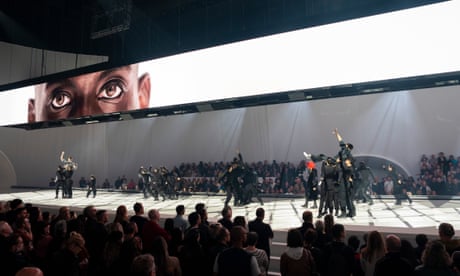
© » THE GUARDIAN
about 21 months ago (02/08/2024)
A cultural manifesto to breathe new life into our dying high streets | Regeneration | The Guardian Skip to main content Skip to navigation Skip to navigation Free Your Mind, an immersive performance with stage design by Es Devlin, at Aviva Studios, Manchester last year...
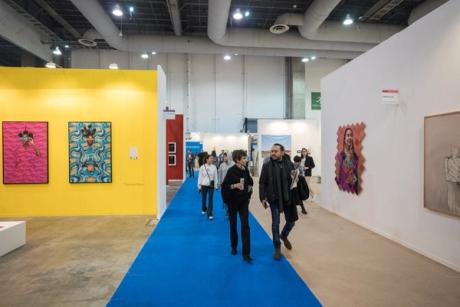
© » THEARTNEWSPER
about 21 months ago (02/05/2024)
How Mexico City’s art scene and its biggest fair, Zona Maco, have grown over 20 years Art market Museums & heritage Exhibitions Books Podcasts Columns Technology Adventures with Van Gogh Search Search Art fairs news How Mexico City’s art scene and its biggest fair, Zona Maco, have grown over 20 years The biggest art fair in Latin America is marking a significant milestone while showcasing the booming local scene Constanza Ontiveros Valdés 5 February 2024 Share Visitors at the 2023 edition of Zona Maco Courtesy Zona Maco This year Mexico City’s Zona Maco art fair, the biggest in Latin America, is celebrating its 20th anniversary...

© » OBSERVER
about 21 months ago (02/01/2024)
Art Fair Founder Zélika García Looks Back on Twenty Years of ZONAMACO | Observer Zélika García...
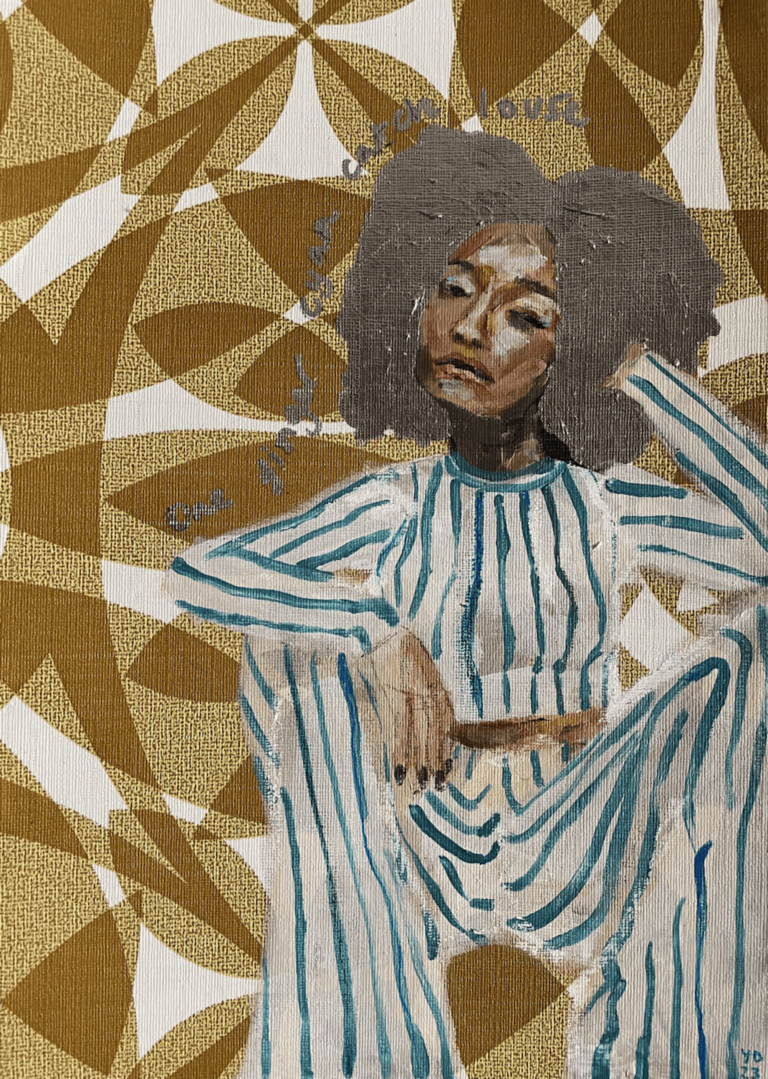
© » FAD MAGAZINE
about 21 months ago (01/26/2024)
Empowering the Next Generation of Diverse Leaders with Cultural Leaders Programme - FAD Magazine Skip to content By Mark Westall • 26 January 2024 Share — Culture& and Sotheby’s Institute of Art, in collaboration with Gallery OCA , announce Together We Thrive , a fundraising exhibition for the Cultural Leaders Programme...

© » LENS CULTURE
about 22 months ago (12/21/2023)
Cultural Changes at the Coldest Place on Earth — A Photo Story from Yakutsk - Photographs by Alex Vasyliev | Essay by Marigold Warner | LensCulture Feature Cultural Changes at the Coldest Place on Earth — A Photo Story from Yakutsk Photographer Alexey Vasyliev offers an intimate look into the life and changing culture of the Evens, an indigenous tribe in his hometown of Yakutsk — one of the coldest places on Earth...

© » ARTSJOURNAL
about 23 months ago (12/18/2023)
As the company celebrates its 100th anniversary, its dominance as a generation-spanning cultural force no longer seems certain....
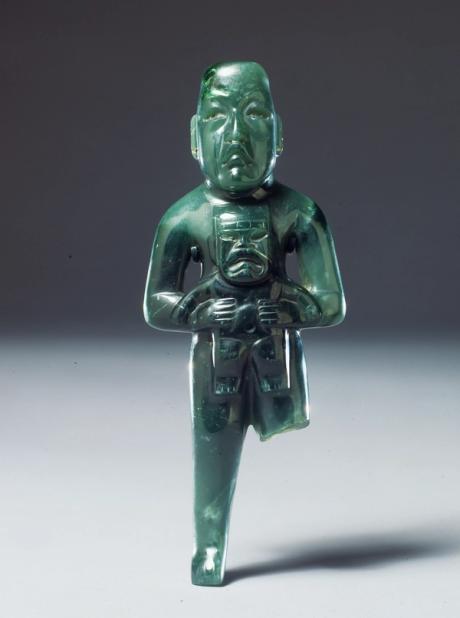
© » THEARTNEWSPER
about 23 months ago (12/14/2023)
Kimbell Art Museum acquires important cultural touchstone of Olmec art Art market Museums & heritage Exhibitions Books Podcasts Columns Technology Adventures with Van Gogh Search Search Museums & Heritage news Kimbell Art Museum acquires important cultural touchstone of Olmec art The jade statuette of an Olmec ruler holding a baby were-jaguar will be exhibited as the centrepiece of the Texas museum's ancient American collection Theo Belci 14 December 2023 Share Standing Figure Holding a Were-Jaguar Baby (around 900BC-300BC) Photo: Justin Kerr., courtesy of the Justin Kerr Maya archive, Dumbarton Oaks, Trustees for Harvard University, Washington, DC The Kimbell Art Museum in Fort Worth, Texas, has acquired Standing Figure Holding a Were-Jaguar Baby (around 900BC-300BC), a jade statuette at the centre of Olmec civilisation studies since the mid-20th century...
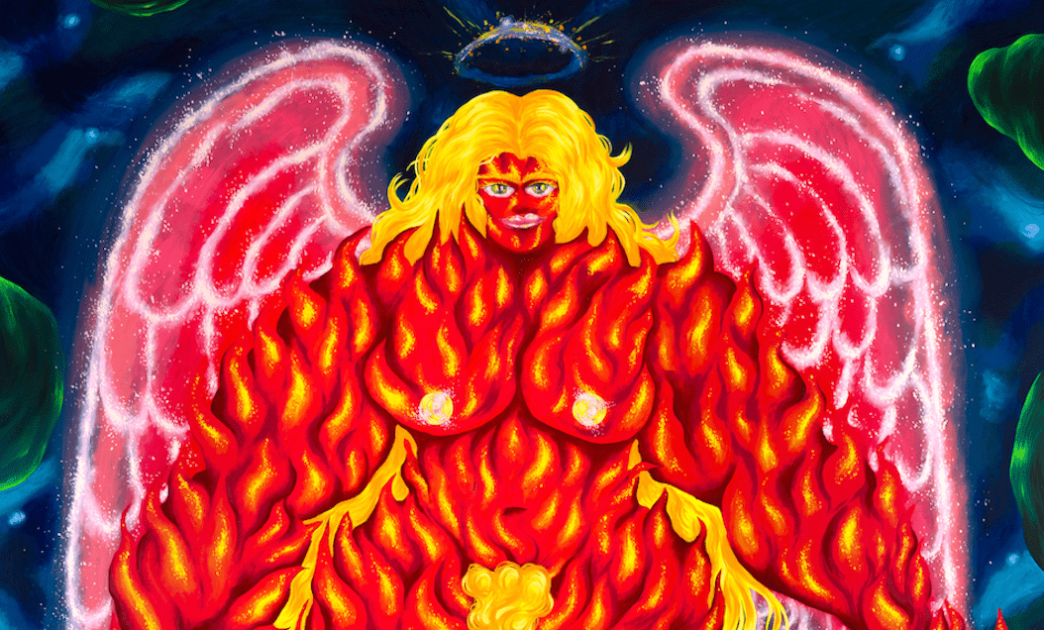
© » ART & OBJECT
about 23 months ago (12/12/2023)
An Interview with Curator Robert Storr | Art & Object Skip to main content Subscribe to our free e-letter! Webform Your Email Address Role Art Collector/Enthusiast Artist Art World Professional Academic Country USA Afghanistan Albania Algeria American Samoa Andorra Angola Anguilla Antarctica Antigua & Barbuda Argentina Armenia Aruba Ascension Island Australia Austria Azerbaijan Bahamas Bahrain Bangladesh Barbados Belarus Belgium Belize Benin Bermuda Bhutan Bolivia Bosnia & Herzegovina Botswana Bouvet Island Brazil British Indian Ocean Territory British Virgin Islands Brunei Bulgaria Burkina Faso Burundi Cambodia Cameroon Canada Canary Islands Cape Verde Caribbean Netherlands Cayman Islands Central African Republic Ceuta & Melilla Chad Chile China Christmas Island Clipperton Island Cocos (Keeling) Islands Colombia Comoros Congo - Brazzaville Congo - Kinshasa Cook Islands Costa Rica Croatia Cuba Curaçao Cyprus Czechia Côte d’Ivoire Denmark Diego Garcia Djibouti Dominica Dominican Republic Ecuador Egypt El Salvador Equatorial Guinea Eritrea Estonia Eswatini Ethiopia Falkland Islands Faroe Islands Fiji Finland France French Guiana French Polynesia French Southern Territories Gabon Gambia Georgia Germany Ghana Gibraltar Greece Greenland Grenada Guadeloupe Guam Guatemala Guernsey Guinea Guinea-Bissau Guyana Haiti Heard & McDonald Islands Honduras Hong Kong SAR China Hungary Iceland India Indonesia Iran Iraq Ireland Isle of Man Israel Italy Jamaica Japan Jersey Jordan Kazakhstan Kenya Kiribati Kosovo Kuwait Kyrgyzstan Laos Latvia Lebanon Lesotho Liberia Libya Liechtenstein Lithuania Luxembourg Macao SAR China Madagascar Malawi Malaysia Maldives Mali Malta Marshall Islands Martinique Mauritania Mauritius Mayotte Mexico Micronesia Moldova Monaco Mongolia Montenegro Montserrat Morocco Mozambique Myanmar (Burma) Namibia Nauru Nepal Netherlands Netherlands Antilles New Caledonia New Zealand Nicaragua Niger Nigeria Niue Norfolk Island Northern Mariana Islands North Korea North Macedonia Norway Oman Outlying Oceania Pakistan Palau Palestinian Territories Panama Papua New Guinea Paraguay Peru Philippines Pitcairn Islands Poland Portugal Puerto Rico Qatar Romania Russia Rwanda Réunion Samoa San Marino Saudi Arabia Senegal Serbia Seychelles Sierra Leone Singapore Sint Maarten Slovakia Slovenia Solomon Islands Somalia South Africa South Georgia & South Sandwich Islands South Korea South Sudan Spain Sri Lanka St...

© » ARTSJOURNAL
about 23 months ago (12/12/2023)
The war in Gaza is tearing the art world apart - Vox Skip to main content clock menu more-arrow no yes mobile Explainers Israel-Hamas war 2024 election Supreme Court Buy less stuff The climate crisis What to watch All explainers Crossword Video Podcasts Politics Policy Culture Science Technology Climate Health Money Life Future Perfect Newsletters ✕ Will you help keep Vox free? Vox's journalism is free, so that everyone can understand our world...

© » ARTNEWS
about 23 months ago (12/11/2023)
Nan Goldin ‘Refused’ to Release Documentary About Herself in Israel – ARTnews.com Skip to main content By Alex Greenberger Plus Icon Alex Greenberger Senior Editor, ARTnews View All December 11, 2023 10:48am Nan Goldin...
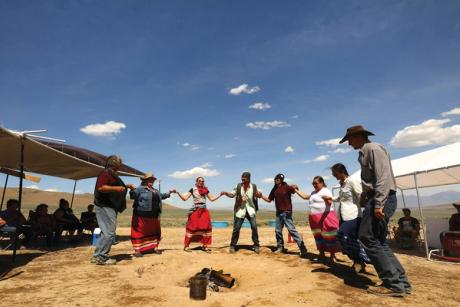
© » THEARTNEWSPER
about 23 months ago (12/08/2023)
Nevada lithium mine threatens cultural sites Art market Museums & heritage Exhibitions Books Podcasts Columns Technology Adventures with Van Gogh Search Search Heritage news Nevada lithium mine threatens cultural sites The US federal government’s manoeuvres to boost domestic lithium extraction are raising fears from tribal communities about archaeological and environmental impacts Gabriella Angeleti 8 December 2023 Share Members of the Fort McDermitt Paiute-Shoshone tribe gather to oppose the Thacker Pass lithium mine Photo: Carolyn Cole/Los Angeles Times via Getty Images The construction of an open-pit lithium mine in northern Nevada, which is scheduled to begin full-fledged operation in 2026, will have irreversible effects on the environment and cultural heritage sites in the region, according to archaeologists, environmentalists and Native American communities who oppose the project...
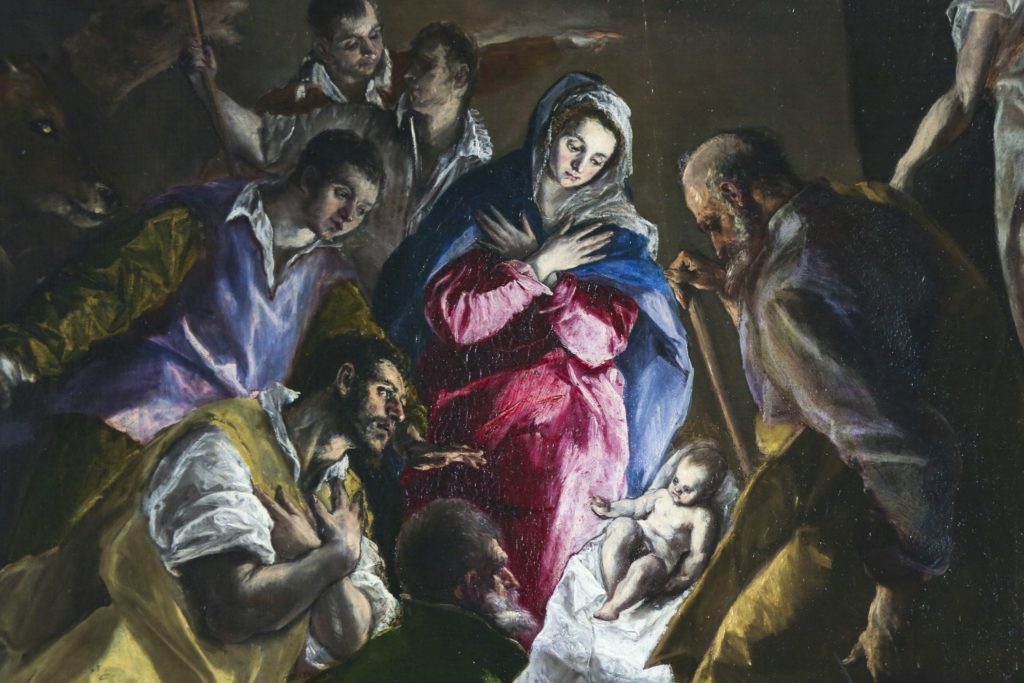
© » FLASH ART
about 23 months ago (11/24/2023)
El Greco / Tino Sehgal Centro Botín / Santander | | Flash Art Flash Art uses cookies strictly necessary for the proper functioning of the website, for its legitimate interest to enhance your online experience and to enable or facilitate communication by electronic means...
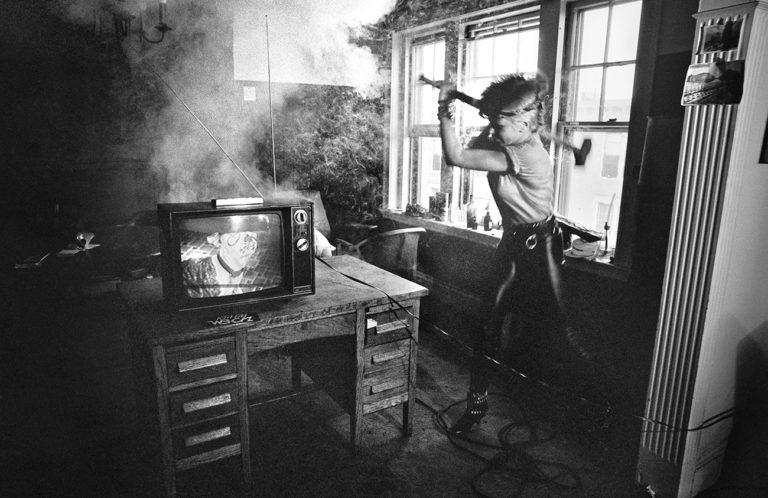
© » EYE OF PHOTOGRAPHY
about 25 months ago (10/15/2023)
L'exposition multimédia Days of Punk du photographe américain Michael Grecco présente à Cascais des photographies d'icônes de la musique telles que The Clash, Johnny Rotten, Ramones, Wendy O...
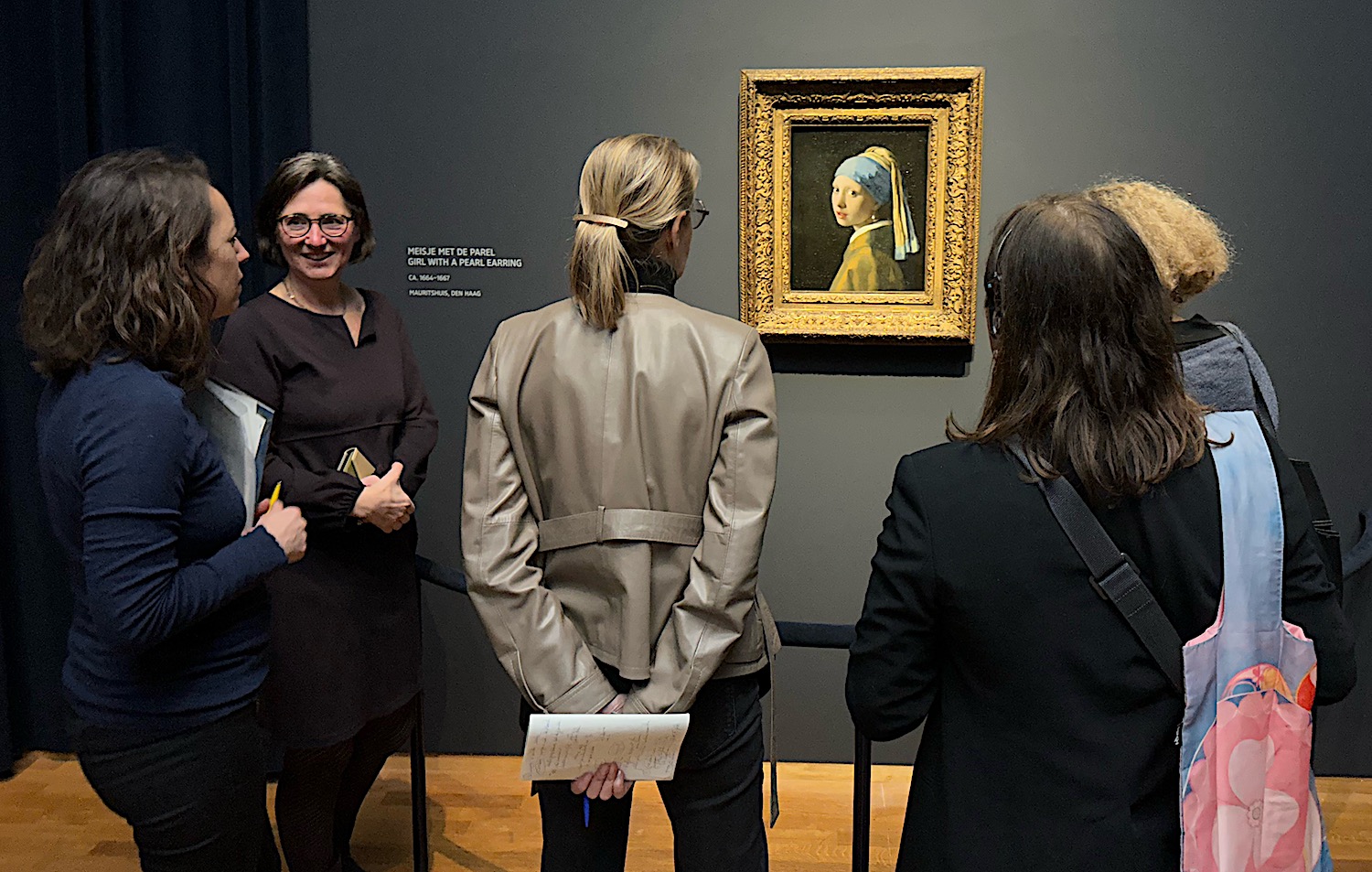
© » ARTLYST
about 25 months ago (10/07/2023)
In the ever-changing landscape of museums, the traditional role of the curator (a much-overused term), which was once perceived as a guardian of collections.....

© » SLASH PARIS
about 28 months ago (07/07/2023)
Chambre à brouillard — Juliette Agnel, Clément Bagot, Nicolas Darrot, Youcef Korichi, Alyssa Verbizh, Anne-Charlotte Yver — L’ahah Griset — Exposition — Slash Paris Connexion Newsletter Twitter Facebook Chambre à brouillard — Juliette Agnel, Clément Bagot, Nicolas Darrot, Youcef Korichi, Alyssa Verbizh, Anne-Charlotte Yver — L’ahah Griset — Exposition — Slash Paris Français English Accueil Événements Artistes Lieux Magazine Vidéos Retour Chambre à brouillard — Juliette Agnel, Clément Bagot, Nicolas Darrot, Youcef Korichi, Alyssa Verbizh, Anne-Charlotte Yver Exposition Dessin, edition, film, installations.....

© » SLASH PARIS
about 28 months ago (07/07/2023)
Chambre à brouillard — Juliette Agnel, Clément Bagot, Nicolas Darrot, Youcef Korichi, Alyssa Verbizh, Anne-Charlotte Yver — L’ahah Griset — Exhibition — Slash Paris Login Newsletter Twitter Facebook Chambre à brouillard — Juliette Agnel, Clément Bagot, Nicolas Darrot, Youcef Korichi, Alyssa Verbizh, Anne-Charlotte Yver — L’ahah Griset — Exhibition — Slash Paris English Français Home Events Artists Venues Magazine Videos Back Chambre à brouillard — Juliette Agnel, Clément Bagot, Nicolas Darrot, Youcef Korichi, Alyssa Verbizh, Anne-Charlotte Yver Exhibition Drawing, publishing, film, installation.....

© » ARTS EQUATOR
about 33 months ago (02/01/2023)
Gen X to Gen Z: Generational Differences in the Shaping of Cambodia’s Cultural Preservation Policies | ArtsEquator Skip to content In Cambodia, most cases of arts censorship are linked to the notion of protecting and preserving culture...

© » LARRY'S LIST
about 37 months ago (10/05/2022)
Kelly Wang's private art museum will be one of the largest private museums of contemporary art in th...
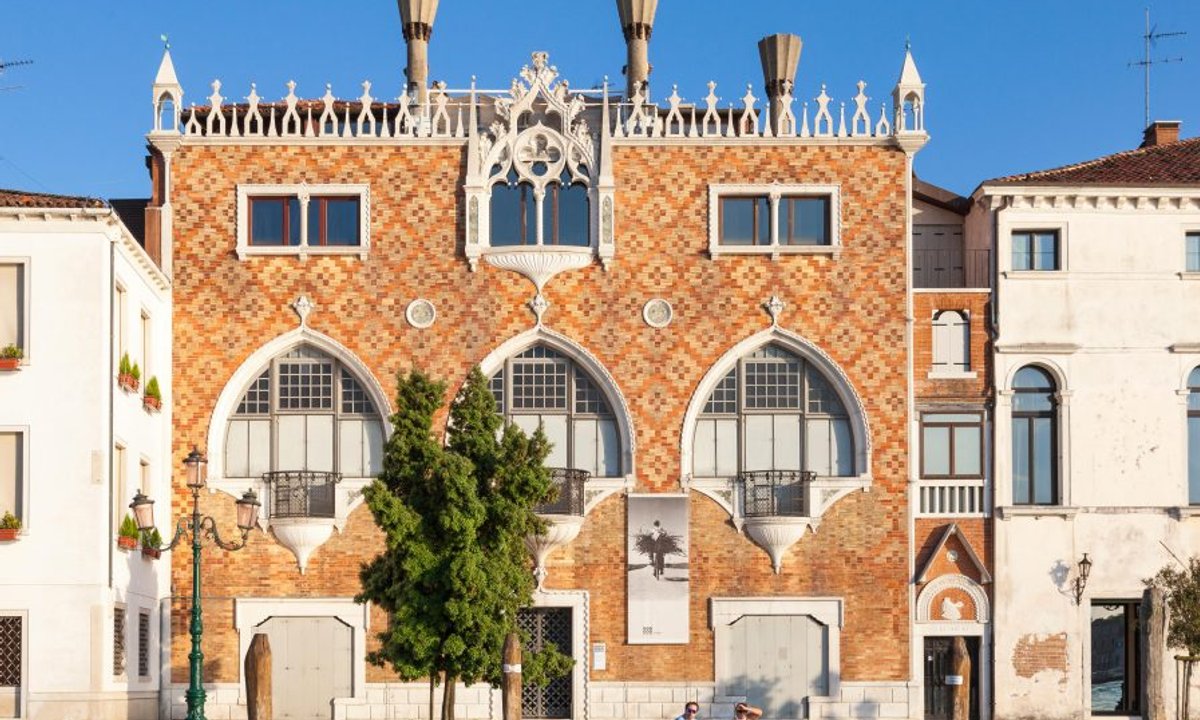
© » LARRY'S LIST
about 37 months ago (10/05/2022)
The Berggruen Institute also announced that philosopher Peter Singer was the recipient of its annual $1m prize...
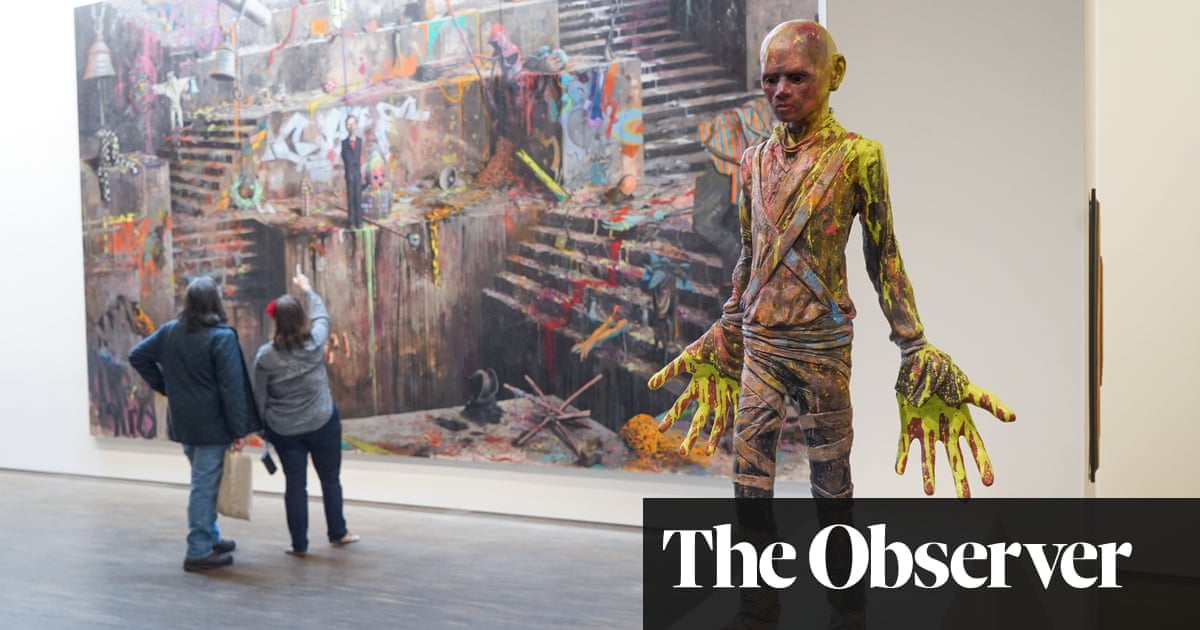
© » LARRY'S LIST
about 37 months ago (10/05/2022)
Thousands of works will disappear from galleries as rent rises and a stand-off with city government take their toll...

© » ARTS EQUATOR
about 40 months ago (07/14/2022)
Tan Boon Hui: A Cultural Leader Of Grace and Courage | ArtsEquator Skip to content The Executive Director of Singapore's Arts House Limited's untimely death last week reverberated through the international art world...
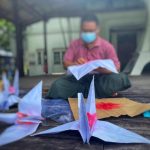
© » ARTS EQUATOR
about 53 months ago (06/07/2021)
Meeting Point 2021: The cultural worker in a time of social change | ArtsEquator Thinking and Talking about Arts and Culture in Southeast Asia Articles Mekong Cultural Hub June 7, 2021 By Wennie Yang (2,000 words, 8-minute read) Laptop fully charged, professional Zoom background selected – Meeting Point 2021 organised by Mekong Cultural Hub and its partners took place virtually between 20 to 22 May 2021...
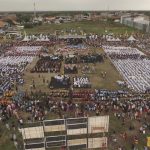
© » ARTS EQUATOR
about 62 months ago (09/07/2020)
Jatiwangi Art Factory: Cultural work that breaks the mould | ArtsEquator Thinking and Talking about Arts and Culture in Southeast Asia Articles Courtesy of Jatiwangi Art Factory September 7, 2020 By Nia Agustina, translation by Eka Wahyuni (1,980 words, 6-minute read) In one corner of West Java, Indonesia, in the Majalengka Regency, a group of volunteers work hand in hand to distribute Personal Protective Equipment (PPE), groceries, food, and medical equipment to people who have to work outside the home during the Covid-19 pandemic...
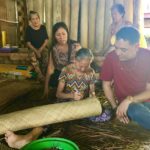
© » ARTS EQUATOR
about 63 months ago (08/17/2020)
Pandemic in the Philippines: A cultural sector on its own | ArtsEquator Thinking and Talking about Arts and Culture in Southeast Asia Articles August 17, 2020 By Katrina Stuart Santiago (2,200 words, 8-minute read) When I was first asked to write about “cultural leadership” in the Philippines, I turned up a blank...
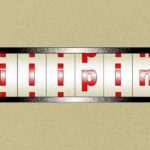
© » ARTS EQUATOR
about 64 months ago (07/09/2020)
Weekly Southeast Asia Radar: Is Filipino gender neutral? ; Cultural tours go online | ArtsEquator Thinking and Talking about Arts and Culture in Southeast Asia ArtsEquator Radar JL JAVIER via CNN Philippines July 9, 2020 ArtsEquator’s Southeast Asia Radar features articles and posts about arts and culture in Southeast Asia, drawn from local and regional websites and publications – aggregated content from outside sources, so we are exposed to a multitude of voices in the region...

© » ARTS EQUATOR
about 65 months ago (06/18/2020)
Weekly Southeast Asia Radar: Artists non-essential? ; Cultural festivals make a comeback | ArtsEquator Thinking and Talking about Arts and Culture in Southeast Asia ArtsEquator Radar Image Dynamics via Jakarta Post June 18, 2020 ArtsEquator’s Southeast Asia Radar features articles and posts about arts and culture in Southeast Asia, drawn from local and regional websites and publications – aggregated content from outside sources, so we are exposed to a multitude of voices in the region...

© » ARTS EQUATOR
about 86 months ago (09/20/2018)
Reflections on the Sight/Unseen Asian Drama Conference | ArtsEquator Thinking and Talking about Arts and Culture in Southeast Asia Articles Che-Min Hsieh September 20, 2018 By Benedict Leong (1700 words, 10-minute read) The Sight/Unseen Asian Drama Conference was a two-day event on 26 – 27 April 2018 at Goldsmiths, University of London, and Tara Arts ...

© » ARTS EQUATOR
about 87 months ago (09/11/2018)
Vietnamese Cultural Week opens in Cambodia (via Nhân Dân) | ArtsEquator Thinking and Talking about Arts and Culture in Southeast Asia Articles September 11, 2018 NDO – The Vietnamese Culture Week opened at Chaktomuk theatre, in Phnom Penh, Cambodia, on September 11...

© » THE INDEPENDENT
about 165 months ago (04/10/2012)
Cultural Life: Maverick Sabre, musician | The Independent | The Independent Music: Recently I've been listening to a record with Ella Fitzgerald on one side and Billie Holiday on the other side, and lots of music by Ahmad Jamal...
-
1970-1979
Julius Koller
1978This work is one of Koller’s many variations which he began to use from 1970 to describe the ‘cultural situations’ he created...
-
1980-1989
José Leonilson
1984O Africano (1984) is a large acrylic painting on canvas, made early in the artist’s career, and directly references both Leonilson’s artistic precursors and his desire to imagine and capture what it means to be Brazilian...
Santu Mofokeng
1985Since the global capital expansion, billboards have been the medium of communication between the rulers and the residents of townships...
-
1990-1999
Alexis Smith
1990Iron Sorrows (1990) brings together what are for Alexis Smith common motifs and materials such as scavenged and repurposed metal, and street signage...
Alexis Smith
1995In 8 Ball Surfboard (1995),Alexis Smith combines her long-term interests in California culture and conceptual assemblage...
Stan Douglas
1997Michigan Central Station is part of a larger photographic series, Detroit Photos , which includes images of houses, theaters, stadiums, offices, and other municipal structures...
-
2000-2009
Juan Capistran
2002The Breaks reflects Capistran’s interests in sampling and fusing different cultural, social, and historical sources...
Jun Nguyen-Hatsushiba
2003Filmed underwater, this is the third video in Nguyen-Hatsushiba’s “Memorial Project” series which began in 2001...
Alexandre da Cunha
2005Glaze (Savana) (2005) is an assemblage of found materials: a car wheel, a tire, and a wooden plinth of the type traditionally used to display sculpture...
Juan Araujo
Drawing & Print
2006(Drawing & Print) Many of Araujo’s works depict reproductions and Libro Ponti II is a recreation of a book on Italian architect Gio Ponti...
Bani Abidi
2008The threshold in contemporary Pakistan between the security of private life and the increasingly violent and unpredictable public sphere is represented in Abidi’s 2009 series Karachi ...
Bani Abidi
2008The threshold in contemporary Pakistan between the security of private life and the increasingly violent and unpredictable public sphere is represented in Abidi’s 2009 series Karachi ...
Shilpa Gupta
2008The three monkeys in Don’t See, Don’t Hear, Don’t Speak are a recurring motif in Gupta’s work and refer to the Japanese pictorial maxim of the “three wise monkeys” in which Mizaru covers his eyes to “see no evil,” Kikazaru covers his ears to “hear no evil,” and Iwazaru covers his mouth to “speak no evil.” For the various performative and photographic works that continue this investigation and critique of the political environment, Gupta stages children and adults holding their own or each other’s eyes, mouths and ears...
Elisheva Biernoff
Drawing & Print
2009(Drawing & Print) Last Postcards is a series of three small double-sided paintings on plywood in which Biernoff imagines the last communications from explorers lost in the wilderness...
Kennedy Browne
2009Milton Friedman on the wonder of the free market pencil is an installation based on 42 blank pages...
-
2010-2019
Brian Tripp
2010For many years Tripp has been involved in reviving Karuk ceremonies that had been discontinued for decades, he developed his signature abstract style, based in Karuk design, ceremonial regalia forms, and related cultural and political iconography...
Brian Tripp
2010For many years Tripp has been involved in reviving Karuk ceremonies that had been discontinued for decades, he developed his signature abstract style, based in Karuk design, ceremonial regalia forms, and related cultural and political iconography...
Hamra Abbas
2010At first glance, Cityscapes (2010) seems to be a collection of panoramic photographs of the city of Istanbul—the kind that are found on postcards in souvenir shops...
Wimo Ambala Bayang
2011Composed of four images, the series Sleeping Elephant in the Axis of Yogyakarta (2011) explores the artist’s observation of how Javanese mythology and cosmology have marked the geography of Yogyakarta, the cultural centre of Indonesia...
Anthony Discenza
2012In Anthony Discenza’s 23-minute audio loop that makes up A Rising Tide Lifts All Boats , a nondescript male voice narrates a series of unlikely pairings: “think Dune meets South Pacific;” “think dubstep meets the Magna Carta;” “think the Food Network meets Igmar Bergman.” Given without inflection or emotion, this recitation uses the structure of a Hollywood elevator pitch to sketch out an unknown project, idea, or structure, conflating and collapsing cultural referents into an implausible mass of contradictions....
Bani Abidi
2012The perceived effortlessness of power, projecting above experiences of labored subordination is examined in Death at a 30 Degree Angle by Bani Abidi, which funnels this projection of image through the studio of Ram Sutar, renowned in India for his monumental statues of political figures, generally from the post-independence generation...
Virlani Hallberg
2012In collaboration with psychoanalyst and cultural theorist Leon Tan, Receding Triangular Square explores traditional Chinese and Taiwanese modalities of psychological healing as alternatives to dominant Western psychiatric and therapeutic practices...
Sharif Waked
2012Bath Time by Sharif Waked is a short video based on the tragi-comic outcome of the Israeli Blockade and the wars in Gaza...
Lam Tung Pang
Drawing & Print
2013(Drawing & Print) Lam Tung Pang created Sketches from train ride Chicago to San Francisco during his travels through the United States researching American curatorial strategies for representing traditional Chinese painting in museums and cultural institutions...
Amie Siegel
2013Winter is a film installation of multiple tenses—shot in the recent past, depicting an unknown future, unfolding (and changing) in the present of the exhibition...
Beatriz Santiago Muñoz
2013Another curious element is that it seemed that I was seeing images from the dreams I had that afternoon...
Sharif Waked
2013Tughra is a protocol by Sharif Waked that reproduces the sixteenth century calligraphic monogram for tughra ; also known as the signature of Suleiman the Magnificent...
Annette Kelm
Drawing & Print
2013(Drawing & Print) Percent for Art is seemingly concerned with “art enrichment” by state or city arts agencies role in it, managing the artist rosters, maintaining public art collections, commissioning artworks, selecting installation sites, among other things for aesthetic and cultural enhancement in both public and private real estate developments...
Shimon Minamikawa
2014In Play , the image comes from a fashion magazine from the 1950’s (USA) whose theme is costume sportswear from the 19th century...
Beatriz Santiago Muñoz
2014La cabeza mató a todos or “The Head that Killed Everyone”, is a mixing of indigenous mythologies with present-day characters, geographies, and culture in Puerto Rico...
Carolina Caycedo
2014YUMA o la tierra de los amigos (YUMA, or the Land of Friends) by Carolina Caycedo is a large mural containing a series of satellite photographs mounted on acrylic...
Calderón & Piñeros (La Decanatura)
2015In Centro Espacial Satelital de Colombia (Colombian Satellite Space Center) , Calderón & Piñeros (La Decanatura) play tribute to two “stunning” satellite antennas installed in the small municipality of Chocontá where, in 1970, the Space Communications Center of Colombia was inaugurated...
Beatriz Santiago Muñoz
2015Marché Salomon by Beatriz Santiago Muñoz depicts two meat vendors, a young man and woman, chatting in Marché Salomon, a busy Port-au-Prince market...
Aslan Goisum
2015The video work Volga by Aslan Goisum begins with a sweeping field caught under a misty, gray sky...
Cristóbal Lehyt
Drawing & Print
2016(Drawing & Print) Cristóbal Lehyt has conducted thorough research on the historical and cultural complexity of the northern region of Chile where the Atacama Desert is located...
Martine Syms
2016Her 2016 video installation quotes the sitcom-as-form and also draws from a 1907 comedic short, Laughing Gas...
José Castrellón
2016Palo Enceba’o is a project by José Castrellón composed of three photographs, two drawings on metal, and a video work that creates a visual and cultural analogy between the events of January 9th, 1964 in Panama City and the game of palo encebado carried out in certain parts of Panama to celebrate the (US-backed) independence from Colombia...
José Castrellón
2016Palo Enceba’o is a project by José Castrellón composed of three photographs, two drawings on metal, and a video work that creates a visual and cultural analogy between the events of January 9th, 1964 in Panama City and the game of palo encebado carried out in certain parts of Panama to celebrate the (US-backed) independence from Colombia...
José Castrellón
2016Palo Enceba’o is a project by José Castrellón composed of three photographs, two drawings on metal, and a video work that creates a visual and cultural analogy between the events of January 9th, 1964 in Panama City and the game of palo encebado carried out in certain parts of Panama to celebrate the (US-backed) independence from Colombia...
Karan Shrestha
2017After the decade-long conflict (1996-2006) that ended with Nepal becoming a Federal Democratic Republic, political unrest and weak governance continued to mark the country’s future as daily life repeatedly witnessed ruptures...
Jibade-Khalil Huffman
2017Jibade-Khalil Huffman’s work brings together spoken and written language, photography, vintage television and computer animation to pay homage to African-American popular culture...
Bayrol Jiménez
2018Sombras de los Valles (Shadows of the Valleys) is part of a series of works created by Bayrol Jiménez in which he is influenced by hand-painted signs and large billboards in Mexico...
Jon Rafman
Advanced Technology
2018(Advanced Technology) View of Harbor by Jon Rafman mines the latent cultural imaginary surrounding climate change and society’s collective death drive...
Naufus Ramírez-Figueroa
2018In Guardian 2 Naufus Ramírez Figueroa explores the historical memory and political reality of the ruins of Kawinal, an archeological site of postclassic Mayan culture that was flooded in order to construct the hydroelectric dam of Chixoy in 1975 in a supposed effort to bring electricity to the country...
Andrés Pereira Paz
2018Juan III (Pescadores En Una Isla) is a series of embroideries made with fake pre-Columbian fabrics produced by the Gonzales family, a three-generation family of pre-Columbian textile “forgers” based in Lima, Peru...
Mazenett Quiroga
2019Gente Serpiente (Serpent People) is a piece made with the wheels of bikes, twisted, intertwined and painted like skins of tropical poisonous snakes...
Karla Kaplun
Drawing & Print
2019(Drawing & Print) Studying the body in movement, this series of drawings depart from Karla Kaplun’s work A ztec BLAST® Workout (AWB) ...
Karla Kaplun
Drawing & Print
2019(Drawing & Print) Studying the body in movement, this series of drawings depart from Karla Kaplun’s work A ztec BLAST® Workout (AWB) ...
Sahana Ramakrishnan
2019Sahana Ramakrishnan’s work blends cultural influences, spanning a range of visual mythologies, she weaves together a tapestry of pop cultural references that are upended by the artist’s exploration of identity, sexuality and gender perspectives...
Rometti Costales
2019Canción para un fósil canoro (Song for a chanting fossil) by Rometti Costales is inspired by the history of the building that currently hosts the Museo de la Solidaridad Salvador Allende (MSSA) in Santiago, Chile...
Xaviera Simmons
2019Xaviera Simmons often employs her own body and collected materials in the service of her photographs and performances...
-
2020-2029
Tarik Kiswanson
Drawing & Print
2020(Drawing & Print) The artist’s Passings series are hand-sewn works composed of radiological scans of items of clothing loaned by the Tiraz Foundation in Jordan...
Andrea Fraser
Drawing & Print
2020(Drawing & Print) The year 2016 is organized like a telephone book; the data corresponding to the contributions are classified in alphabetical order by the name of the donor...
Ciprian Muresan
2020Forgotten Statues , 2020 continues the artist’s reflections on power and the fragility of works of art...
Pangrok Sulap
Drawing & Print
2021(Drawing & Print) All Nations are Created Special is a black and white woodcut print by the artist collective Pangrok Sulap...
Lotus Laurie Kang
2022Scaffold by Lotus Laurie Kang features a seemingly disjointed amalgamation of materials between flat fabrics and lumps of aluminum...
Sandra Monterroso
Drawing & Print
2023(Drawing & Print) Presented as part of a recent group of works titled The Paradox of Healing, Rhombus for Healing No...







































